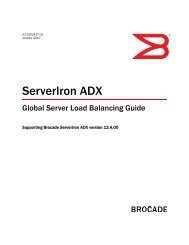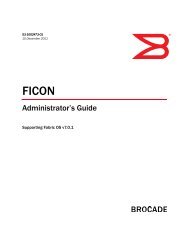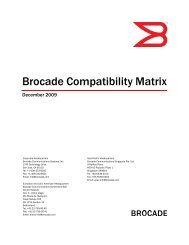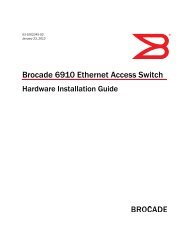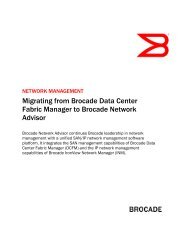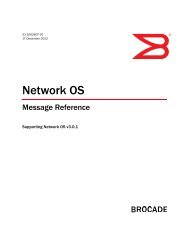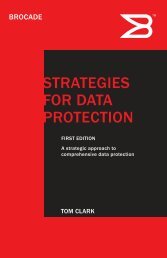- Page 1 and 2:
SECURINGFIBRECHANNELFABRICSSECOND E
- Page 3:
SECURINGFIBRECHANNELFABRICSSECOND E
- Page 6 and 7:
© 2012 Brocade Communications Syst
- Page 8 and 9:
viSecuring Fibre Channel Fabrics
- Page 10 and 11:
viiiSecuring Fibre Channel Fabrics
- Page 12 and 13:
ContentsChapter 4: Security Basics
- Page 14 and 15:
ContentsIsolation and Separation ..
- Page 16 and 17:
ContentsxivSecuring Fibre Channel F
- Page 18 and 19:
Chapter 1: Introduction• The Euro
- Page 20 and 21:
Chapter 1: IntroductionThe SAN Secu
- Page 22 and 23:
Chapter 1: IntroductionInternet sta
- Page 24 and 25:
Chapter 1: Introductionoften, the s
- Page 26 and 27:
Chapter 2: SAN Security MythsSAN Se
- Page 29 and 30:
SAN Security Myth Number 5SAN Test
- Page 31 and 32:
SAN Security Myth Number 6To demons
- Page 33 and 34:
SAN Security Myth Number 7SAN Secur
- Page 35 and 36:
SAN Basics for SecurityProfessional
- Page 37 and 38:
Evolution of the FC ProtocolTable 1
- Page 39 and 40:
Fibre Channel BasicsTable 2. FC pro
- Page 41 and 42:
Fibre Channel BasicsFC FabricsFC fa
- Page 43 and 44:
Fibre Channel BasicsType Category N
- Page 45 and 46:
FC Fabric Features and ServicesAn F
- Page 47 and 48:
FC Fabric Features and Servicesing
- Page 49 and 50:
FC Fabric Features and ServicesWhen
- Page 51 and 52:
FC Fabric Features and ServicesAnd
- Page 53 and 54:
FC Fabric Features and ServicesSwit
- Page 55 and 56:
FC Fabric Features and ServicesAs c
- Page 57 and 58:
FC Fabric Features and ServicesSwit
- Page 59 and 60:
FC Fabric Features and Servicesothe
- Page 61 and 62:
Security Basics forStorage Professi
- Page 63 and 64:
Security Modelshave enacted such le
- Page 65 and 66:
Security Modelssures must be taken
- Page 67 and 68:
Types of ThreatsTypes of ThreatsA t
- Page 69 and 70:
Types of ThreatsOne significant thr
- Page 71 and 72:
Types of Threatsside attacks such t
- Page 73 and 74:
Types of Threatsences from previous
- Page 75 and 76:
AttacksAttacksAttackers have many o
- Page 77 and 78:
Attackstion between the two parties
- Page 79 and 80:
Identification and AuthenticationBi
- Page 81 and 82:
Physical SecurityOne challenge with
- Page 83 and 84:
Physical SecurityPhysical access co
- Page 85 and 86:
Information Disposal and Sanitizati
- Page 87 and 88:
Chapter SummaryAlgorithm Passes Des
- Page 89 and 90:
Elementary Cryptography5This chapte
- Page 91 and 92:
Common Cryptography TermsHere are s
- Page 93 and 94:
Symmetric vs. Asymmetric Cryptograp
- Page 95 and 96:
Cryptographic Algorithms• Range o
- Page 97 and 98:
Cryptographic AlgorithmsHashing alg
- Page 99 and 100:
Modes of Operationencryption proces
- Page 101 and 102:
Modes of OperationRSAAt around the
- Page 103 and 104:
Key ManagementSSL can be used with
- Page 105 and 106:
Key ManagementBrocade Encryption De
- Page 107 and 108:
FC Security Best Practices6In previ
- Page 109 and 110:
The Brocade SAN Security ModelThe m
- Page 111 and 112:
The Brocade SAN Security ModelStora
- Page 113 and 114:
The Brocade SAN Security ModelChann
- Page 115 and 116:
The Brocade SAN Security Modelrestr
- Page 117 and 118:
The Brocade SAN Security Modeltem a
- Page 119 and 120:
The Brocade SAN Security ModelPassw
- Page 121 and 122:
The Brocade SAN Security ModelData
- Page 123 and 124:
The Brocade SAN Security ModelWith
- Page 125 and 126:
Encrypting Data-in-FlightEncrypting
- Page 127 and 128:
Encrypting Data-at-RestEncrypting D
- Page 129 and 130:
Encrypting Data-at-Restand disk dev
- Page 131 and 132:
Encrypting Data-at-RestPhysical Sec
- Page 133 and 134:
Encrypting Data-at-RestTraining and
- Page 135 and 136:
Chapter SummaryChapter SummaryAltho
- Page 137 and 138:
Deploying SAN-AttachedDevices in a
- Page 139 and 140:
Securing the Servers in the DMZpoli
- Page 141 and 142:
Securing the Storage DevicesFor exa
- Page 143 and 144:
Securing the Storage DevicesInterne
- Page 145 and 146:
Auditing and Assessing the SANAudit
- Page 147 and 148:
Securing FOS-Based Fabrics8When it
- Page 149 and 150:
Securing Management InterfacesThe f
- Page 151 and 152:
Securing Management InterfacesThe t
- Page 153 and 154:
Securing Management InterfacesFilte
- Page 155 and 156:
Securing Management InterfacesThe f
- Page 157 and 158:
Securing Management Interfacesadmin
- Page 159 and 160: FC-Specific SecurityFC-Specific Sec
- Page 161 and 162: FC-Specific SecurityBrocade-support
- Page 163 and 164: FC-Specific SecurityTo prevent this
- Page 165 and 166: Fabric-Based Encryptionthe Brocade
- Page 167 and 168: Fabric-Based Encryption3. (LDAP onl
- Page 169 and 170: Chapter SummaryInsistent Domain IDI
- Page 171 and 172: Compliance and Storage9Certainly, m
- Page 173 and 174: Payment Card Industry Data Security
- Page 175 and 176: Breach Disclosure LawsThe precedent
- Page 177 and 178: Gramm-Leach-Bliley Act (GLBA)vides
- Page 179 and 180: Federal Information Processing Stan
- Page 181 and 182: Common Criteria (CC)allow different
- Page 183 and 184: Defense Information Systems Agency
- Page 185 and 186: Other SAN Security Topics10SAN secu
- Page 187 and 188: The Future of Key ManagementThe Fut
- Page 189 and 190: Brocade Data EncryptionProducts11Br
- Page 191 and 192: Brocade Encryption for Data-At-Rest
- Page 193 and 194: Brocade Encryption for Data-At-Rest
- Page 195 and 196: Brocade Encryption Features• Data
- Page 197 and 198: Brocade Encryption FeaturesThe next
- Page 199 and 200: Brocade Encryption FeaturesDEK clus
- Page 201 and 202: Brocade Encryption Featuresthe DEK
- Page 203 and 204: Brocade Encryption FeaturesThe foll
- Page 205 and 206: Brocade Encryption InternalsFigure
- Page 207 and 208: Design and Implementation Best Prac
- Page 209: Design and Implementation Best Prac
- Page 213 and 214: Chapter SummarySite ACiphertextSite
- Page 215 and 216: Fabric OS SecurityFeatures MatrixAL
- Page 217 and 218: Security FeatureFOS2.xFOS3.xFOS4.x+
- Page 219 and 220: Security FeatureFOS2.xFOS3.xFOS4.x+
- Page 221 and 222: Standards Bodies andOther Organizat
- Page 223 and 224: IETFSpecifically, the SNIA Security
- Page 225 and 226: IndexNumerics3DES 4Aaccess control
- Page 227 and 228: Indexhuman threat 9Iidentification



